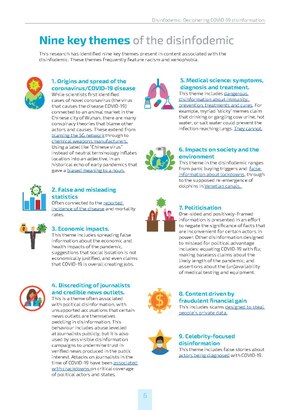
Back Samesweringsteorieë oor die Covid-19-pandemie AF معلومات مغلوطة عن جائحة فيروس كورونا Arabic معلومات غلط عن وباء ڤايروس كورونا 2019–2020 ARZ Дэзінфармацыя, звязаная з пандэміяй COVID-19 у 2019—2020 гадах BE কোভিড-১৯ এর বৈশ্বিক মহামারী সংক্রান্ত ভুল তথ্য Bengali/Bangla Desinformació relacionada amb la pandèmia de la COVID-19 Catalan زانیاری نادروست دەربارەی پەتای جیھانیی کۆڤید-١٩ CKB Dezinformace o pandemii covidu-19 Czech Falschinformationen zur COVID-19-Pandemie German Παραπληροφόρηση σχετικά με την πανδημία COVID-19 Greek

| Part of a series on the |
| COVID-19 pandemic |
|---|
 |
|
|
|
False information, including intentional disinformation and conspiracy theories, about the scale of the COVID-19 pandemic and the origin, prevention, diagnosis, and treatment of the disease has been spread through social media, text messaging,[1] and mass media. False information has been propagated by celebrities, politicians, and other prominent public figures. Many countries have passed laws against "fake news", and thousands of people have been arrested for spreading COVID-19 misinformation. The spread of COVID-19 misinformation by governments has also been significant.
Commercial scams have claimed to offer at-home tests, supposed preventives, and "miracle" cures.[2] Several religious groups have claimed their faith will protect them from the virus.[3] Without evidence, some people have claimed the virus is a bioweapon accidentally or deliberately leaked from a laboratory, a population control scheme, the result of a spy operation, or the side effect of 5G upgrades to cellular networks.[4]
The World Health Organization (WHO) declared an "infodemic" of incorrect information about the virus that poses risks to global health.[5] While belief in conspiracy theories is not a new phenomenon, in the context of the COVID-19 pandemic, this can lead to adverse health effects. Cognitive biases, such as jumping to conclusions and confirmation bias, may be linked to the occurrence of conspiracy beliefs.[6] Uncertainty among experts, when combined with a lack of understanding of the scientific process by laypeople, has likewise been a factor amplifying conspiracy theories about the COVID-19 pandemic.[7] In addition to health effects, harms resulting from the spread of misinformation and endorsement of conspiracy theories include increasing distrust of news organizations and medical authorities as well as divisiveness and political fragmentation.[8]
- ^ Murphy H, Di Stefano M, Manson K (20 March 2020). "Huge text message campaigns spread coronavirus fake news". Financial Times. Archived from the original on 25 March 2020. Retrieved 25 March 2020.
- ^ "Fraudulent Coronavirus Disease 2019 (COVID-19) Products". U.S. Food and Drug Administration (FDA). 4 January 2021. Archived from the original on 5 March 2021. Retrieved 5 January 2021.
- ^ Kowalczyk O, Roszkowski K, Montane X, Pawliszak W, Tylkowski B, Bajek A (December 2020). "Religion and Faith Perception in a Pandemic of COVID-19". Journal of Religion and Health. 59 (6): 2671–2677. doi:10.1007/s10943-020-01088-3. ISSN 0022-4197. PMC 7549332. PMID 33044598.
- ^ "COVID: Top 10 current conspiracy theories". Alliance for Science. Archived from the original on 5 August 2020. Retrieved 5 January 2021.
- ^ Kassam N (25 March 2020). "Disinformation and coronavirus". The Interpreter. Lowy Institute. Archived from the original on 8 May 2020. Retrieved 25 March 2020.
- ^ Kuhn SA, Lieb R, Freeman D, Andreou C, Zander-Schellenberg T (March 2021). "Coronavirus conspiracy beliefs in the German-speaking general population: endorsement rates and links to reasoning biases and paranoia". Psychological Medicine. 52 (16): 4162–4176. doi:10.1017/S0033291721001124. PMC 8027560. PMID 33722315.
- ^ Nadesan M (28 April 2022). "Crises Narratives Defining the COVID-19 Pandemic: Expert Uncertainties and Conspiratorial Sensemaking". American Behavioral Scientist. doi:10.1177/00027642221085893. PMC 9051992.
- ^ Radford B (November–December 2020). "Conspiracy Theories Grow as COVID-19 Spreads". Skeptical Inquirer. Amherst, New York: Center for Inquiry. p. 5. Archived from the original on 19 May 2023. Retrieved 18 March 2023.